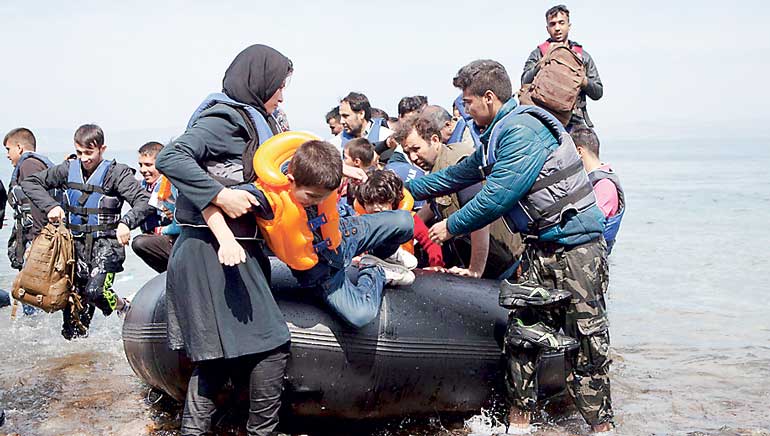Saturday Feb 28, 2026
Saturday Feb 28, 2026
Thursday, 10 September 2015 00:00 - - {{hitsCtrl.values.hits}}
 Afghan refugees arrive on a dinghy on the Greek island of Lesbos, September 9, 2015
Afghan refugees arrive on a dinghy on the Greek island of Lesbos, September 9, 2015
At least 850,000 people are expected to cross the Mediterranean seeking refuge in Europe this year and next, the United Nations said on Tuesday, giving estimates that already look conservative.
The UN refugee agency UNHCR called for more cohesive asylum policies to deal with the growing numbers.
Many are refugees from Syria, driven to make the voyage by intensified fighting there and worsening conditions for refugees in surrounding countries due to funding shortfalls in aid programmes, UNHCR said.
“In 2015, UNHCR anticipates that approximately 400,000 new arrivals will seek international protection in Europe via the Mediterranean. In 2016 this number could reach 450,000 or more,” it said in an appeal document.
Spokesman William Spindler said the prediction for this year was close to being fulfilled, with 366,000 having already made the voyage. The total will depend on whether migrants stop attempting the journey as the weather gets colder and the seas more perilous.
So far, the numbers do not appear to have slowed down as the colder months approach, with many appearing spurred on by Germany’s announcement that it will ease the rules for Syrians seeking refuge who first reach the European Union through other countries.
A single-day record 7,000 Syrian refugees arrived in the former Yugoslav republic of Macedonia on Monday, while 30,000 are on Greek islands, most of them on Lesbos, it said.
Many arrive first in Greece, then leave the EU to travel up through the Balkans to Hungary and onward to Germany.
“So obviously the discussions this week in Europe are taking even on greater urgency because it obviously cannot be a German solution to a European problem,” UNHCR spokeswoman Melissa Fleming told a news briefing.
UNHCR chief Antonio Guterres called for an increase in the number of legal ways for refugees to come to Europe, such as an increase in number of visas and ways to reunite people with their families.
“I am convinced that with the proper instruments in place, this will be much easier to manage,” he told a news conference in Paris.
Germany told its European partners on Monday they must take in more refugees as it handles record numbers of asylum seekers.
The European Union’s executive Commission is expected to unveil a programme this week that would redistribute 160,000 asylum seekers who arrive in Italy, Hungary and Greece.
Peter Sutherland, special representative of the UN secretary-general for migration and development, called for a ‘harmonised system’ and ‘fair allocation’ in the European Union.
He said Europe’s ‘Dublin rules’ requiring asylum seekers to apply in the first EU country they reach would have to be amended, or they could jeopardise the principles of border control-free travel in the bloc’s Schengen zone.
“Coherence is going to require leadership and leadership before we see the destruction of great achievements like the Schengen agreement,” he warned. “I think Dublin doesn’t work.”
Global response
Other countries – including the United States, wealthy Gulf states and Japan – must face their responsibilities, he said.
The White House on Tuesday said the Obama administration is taking into account the urgency of the migrant crisis in Europe as it considers further steps that the United States can take.
White House spokesman Josh Earnest declined to discuss the options at a briefing with reporters but said: “Everyone is well aware of the sense of urgency.”
Reuters: German Chancellor Angela Merkel said on Wednesday (9) that refugees arriving in Europe’s largest economy in pursuit of a better life rather than to escape persecution or war would have to go back.
“Those who are not fleeing political persecution or war but are coming to us out of economic need will not be able to stay in Germany,” she told the German parliament.
She also said that that the euro zone economy was in better shape than a year ago and said reform efforts by countries like Spain and Ireland had paid off.
“If we look at the euro zone as a whole, we can say that there is an economic recovery, the situation is better than a year ago. In particular, the euro countries that carried out deep reforms, Spain and Ireland, are growing more than average. Spain is growing as fast as it did before the crisis. We can only say that the reform path was worth it,” she added.
In remarks on the current refugee crisis, the floor leader of the opposition Left party in his speech warned of “huge problems” ahead.
“Wars and war-like disputes are happening in Syria, in Yemen, in Iraq, in Turkey, in Ukraine and in other countries. Wars kill, they annihilate and destroy. And people are fleeing in order not be killed and not to be annihilated,” “Die Linke” floor leader, Gregor Gysi, said.
Struggling to cope with record numbers of asylum seekers, Germany told its European partners on Monday (7) they too must take in more refugees.